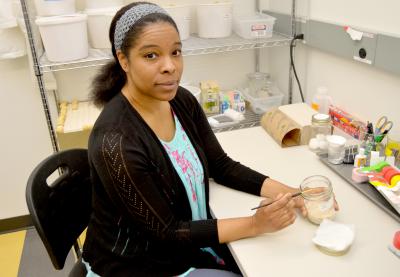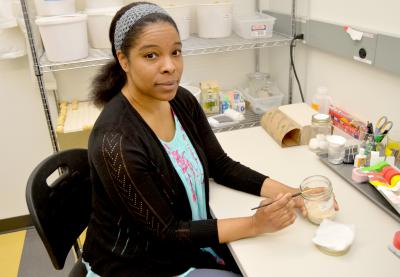
Credit: UTA
UTA biology doctoral student Marquerite Herzog has been awarded a prestigious National Science Foundation Graduate Research Fellowship to study the molecular genetic basis of changes in behavior seen when an individual loses an aggressive conflict. These traits, which often include a period of time of isolation or submissiveness, are often referred to as the "loser" effect.
"To date there are no studies that have documented the changes in gene expression from the time an individual loses a conflict and changes behavior to the time when he or she recovers," Herzog said. "Finding out the molecular basis of the mechanism that produces the malaise and the switch that returns them to normal could have wide-ranging applications across multiple species."
Herzog's interest in this issue grew from her experiences as a military veteran who also worked extensively with military personnel returning from Iraq and Afghanistan with combat-induced Post-Traumatic Stress Disorder or PTSD.
"Many of these veterans show the same behaviors," Herzog said. "I am hoping that over the long-term, this work could contribute to helping them recover from combat-related stress disorders."
Herzog is studying the broad-horned flour beetle, Gnatoceros cornutus, an insect that fights other males for access to mating opportunities. When these insects experience social defeat, they go into a malaise for a few days and then return to normal activities, including fighting their peers for mates.
In the research project, Herzog plans to extract and sequence the RNA of beetles who lose fights and compare them to beetles that have not fought, using an Ilumina sequencing platform from UTA's new research resource, the North Texas Genome Center.
"The North Texas Genome Center's high-quality sequencing equipment will allow me to identify the genes and the proteins associated with the "loser" effect and recovery," Herzog said. "By studying these genetic components of behavior, I will be able to provide answers not only for the biological sciences but potentially across other disciplines such as psychology and sociology, environmental science, resource management and education."
Herzog's mentor, associate professor of biology Jeffery Demuth, was among the first to congratulate her on this impressive achievement.
"Marquerite's approach to studying the genetic components of behavior highlights the central role of genomics in the modern research enterprise, encompassing a number of UTA's strategic theme areas like data-driven discovery and health and the human condition," Demuth said. "Gaining expertise in this burgeoning field will no doubt benefit both her and the university going forward."
The GRFP provides three years of financial support within a five-year fellowship period ($34,000 annual stipend and $12,000 cost-of-education allowance to the institution).
Media Contact
Louisa Kellie
[email protected]
817-524-8926
@utarlington
http://www.uta.edu
Original Source
https://www.uta.edu/news/releases/2018/04/Marquerite%20Herzog%20NSF%20Graduate%20Research%20Fellowship%20.php





